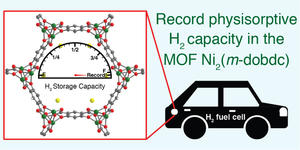COFs and their cousin materials, metal organic frameworks (MOFs), are porous three-dimensional crystals with extraordinarily large internal surface areas that can absorb and store enormous quantities of targeted molecules. Invented by UC Berkeley's Professor Omar Yaghi, COFs and MOFs consist of molecules (organics for COFs and metal-organics for MOFs) that are stitched into large and extended netlike frameworks whose structures are held together by strong chemical bonds. Such frameworks show great promise for, among other applications, carbon sequestration.
- « first View: Taxonomy term
- ‹ previous View: Taxonomy term
- 1 of 7 View: Taxonomy term
- 2 of 7 View: Taxonomy term
- 3 of 7 View: Taxonomy term
- 4 of 7 View: Taxonomy term (Current page)
- 5 of 7 View: Taxonomy term
- 6 of 7 View: Taxonomy term
- 7 of 7 View: Taxonomy term
- next › View: Taxonomy term
- last » View: Taxonomy term







 Scientists have long sought to mimic the process by which plants make their own fuel using sunlight, carbon dioxide, and water through artificial photosynthesis devices, but how exactly substances called catalysts work to generate renewable fuel remains a mystery.
Scientists have long sought to mimic the process by which plants make their own fuel using sunlight, carbon dioxide, and water through artificial photosynthesis devices, but how exactly substances called catalysts work to generate renewable fuel remains a mystery.

